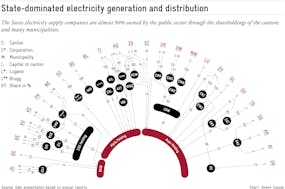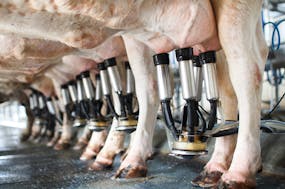Why does meat cost so much more in Switzerland than in France or Germany? Why do thousands of Swiss shoppers flock across the frontier every week to buy even the most basic provisions? Border hopping may have its gastronomic delights, but the prime reason is simple: the extraordinary power of Switzerland’s farm lobby.
Farmers can count on the majority of national conservatives and many centrist politicians in the parliament. They form by far the single biggest and most powerful lobby in the federal parliament. The two top representatives of Swiss Farmers’ Union, for example, are both MPs.
Farmers have not only proved adept at getting elected, they have also learned to be particularly wily political operators. One of the strengths of the farm lobby in parliament over the years has been its skill at striking back scratching deals with other parliamentary interest groups.
Part of national identity
That strength explains much of the ability of Swiss farmers to protect their interests – notably through tough barriers on foreign food. It is reinforced by a deep and widely shared national belief in the land, environment and traditional alpine way of life, underscored by years of publicity by big supermarket chains and product federations extolling the allegedly superior quality and distinctiveness of Swiss goods.
Certainly, Switzerland’s harsh topography and climate mitigate against cheap farming, as do the country’s comparatively high input costs. Farms tend to be small, family affairs, far removed from the megabusinesses of rural France or much of eastern Germany. Moreover, unlike, say, the once flourishing domestic textiles industry, Swiss voters generally accept the sight and sound of happy cows with their clanking bells are an essential part of their national identity, and worth paying for.
Difficulties for trade agreements
But agricultural protectionism can lead to big difficulties amid accelerating trade liberalisation and negotiations with ever stronger regional partnerships.
The current negotiations with the Mercosur bloc – the group of four Latin American nations including Brazil – provide an object lesson in the pressures Swiss agriculture is facing. After almost 20 years of talks, Switzerland’s neighbours in the European Union are nearing accord on a free trade agreement. An agreement would see a progressive reduction in tariffs that currently range up to 35 per cent, and give EU exporters easier access to a market of more than 260 million people. The savings for European countries in tariffs alone could amount to Euro 4 billion a year, let alone the untold benefits of removing assorted non tariff barriers.
A successful outcome could indirectly affect Switzerland. Aware that EU competitors could gain better access to Mercosur, Swiss negotiators, along with colleagues from other members of the Efta trading alliance, have been trying to secure similar terms from Brazil, Argentina, Uruguay and Paraguay, the four Mercosur countries. But while talks on duties on industrial goods and technical standards have progressed, farming has proved a serious sticking point.
“In contrast to existing free trade agreements, in which agriculture has either been deliberately excluded, or which have involved broadly complementary farm goods, Switzerland this time won’t be able to avoid tough talks”, says Patrick Dümmler of Avenir Suisse.
«Gaining acceptance»
“The issue will not so much be about successfully concluding the Mercosur talks, but gaining domestic acceptance for a deal. This would be the first time Switzerland has sealed a free trade agreement involving substantial concession on opening the Swiss agricultural market ”, Dümmler adds.
The Swiss farm lobby is already up in arms, with talk of “sacrificing farmers” for the sake of foreign trade.
As a small, open economy, exports are in fact the overwhelming driver of Swiss prosperity, explaining the enthusiasm of Swiss industry for a deal. Even if an agreement with Mercosur were reached, farmers would be cushioned, as the nation’s borders would not immediately be opened to cheaper imports: some products would continue to enjoy tariff protection, while levies on others would decline only gradually, giving farmers plenty of time to adjust. There might also be volume ceilings on specific Latin American products – such as beef – that could enter tariff free.
Forced to change
But whatever the fine print, Swiss concessions will be required given the importance of agriculture for Mercosur. Almost 6 per cent of the region’s gross domestic product stems from the farm sector, meaning regional farmers will press hard for unhindered access.
Switzerland will be forced to change. “Our farmers face serious ecological challenges, let alone growing consumer dissatisfaction about high prices and the rising misgivings about farmers’ ability to hamper free trade deals”, says Dümmler. “Fundamentally reforming Swiss agricultural policy will be one of the biggest challenges of the next decade.”





